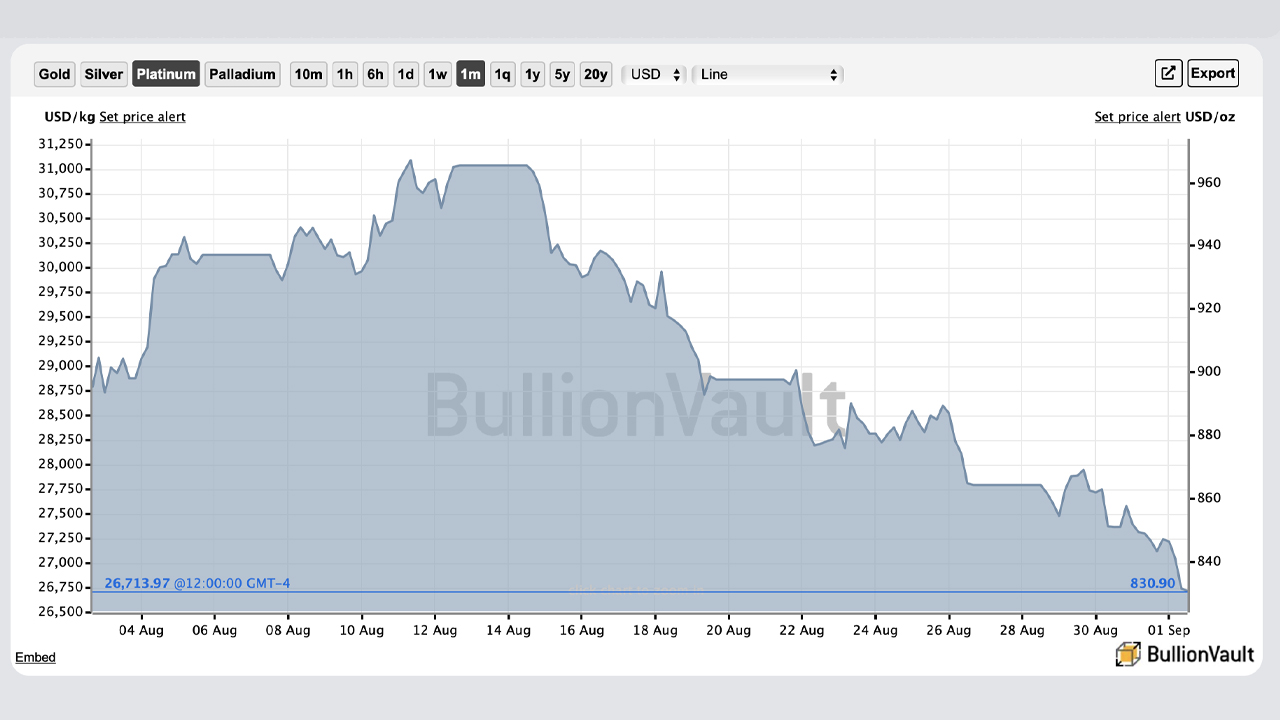Gold and Silver Markets Shudder, Analysts Say Firm Dollar and Rate Hikes May Drag Precious Metal Markets Lower – Economics Bitcoin News
Precious metal markets have shuddered during the last few weeks, as gold’s price per ounce nears a six-week low hovering just under $1,700 per unit. Silver crashed through the $18 range slipping to $17.80 per ounce. While both gold and silver dipped between 0.85% to 0.89% against the U.S. dollar in 24 hours, platinum dropped 2.82% and palladium shed 4.18% against the USD during the last day.
Despite Scorching Global Inflation, Gold Hasn’t Been a Safe Haven in 2022
While the entire world is suffering from red-hot inflation, many would assume that the world’s precious metals would be a safe haven against the surging prices. That hasn’t been the case in 2022, despite the U.S. and the Eurozone inflation rate rising above 9% this summer.

In 2022, an ounce of fine gold managed to reach a lifetime price high against the U.S. dollar at $2,070 per ounce. On the same day (March 8, 2022), an ounce of silver tapped a 2022 high at $26.46 per ounce.

Year-to-date, silver is down 23.14% as it was trading for 23.16 nominal U.S. dollars per troy ounce on January 1, 2022. Since the high on March 8, silver is down 32% lower than the nominal U.S. dollars per troy ounce value. Gold’s nominal U.S. dollar value per troy ounce on January 1, 2022, was $1,827.49 per ounce and at today’s $1,695.45 per ounce value, gold is down 7.22%.

Furthermore, any investors who bought gold at the lifetime price high on March 8, lost roughly 18.09% in USD value since that day. Platinum, palladium, and rhodium values have seen similar declines in value and even more volatility than gold and silver.
Precious metals (PMs) have long played a key role in the global economy and traditionally, PMs like gold and silver have been seen as a hedge against inflation. However, this has not been the case in 2022, and the blame is being placed on a robust greenback and the Federal Reserve hiking interest rates.
Analysts Say Strong Dollar, Hawkish Fed Points to Lower Gold Prices, Dollar Index Taps 20-Year High
Przemyslaw Radomski, CEO of investment advisory firm Sunshine Profits told Forbes at the end of June that a “more hawkish Fed, implying higher real interest rates, and a stronger U.S. dollar, both point to lower gold prices.” The market strategist at dailyfx.com, Justin McQueen, says “a firmer USD and a renewed rally in global bond yields have dragged gold prices.”
The fxstreet.com analyst Dhwani Mehta explained on Thursday that gold prices could drop even lower from here, if gold bears hold the market reigns. “The Technical Confluence Detector shows that the gold price is gathering strength for the next push lower, as bears aim for the pivot point one-day S2 at $1,700,” Mehta wrote on September 1. The fxstreet.com analyst added:
If sellers find a strong foothold below the latter, a sharp sell-off towards the pivot point one-day S3 at $1,688 will be inevitable.
David Meger, the director of metals trading at High Ridge Futures, blames gold’s poor performance on the statements Federal Reserve chair Jerome Powell made last week at the Jackson Hole Symposium.
“There is continued pressure on gold from Powell’s last week comments that raised [the] expectation of a more aggressive Fed,” Meger said. “Gold being a non-interest bearing asset will have more competition.”
Moreover, the U.S. Dollar Index tapped a 20-year high of 109.592 on Thursday, and the reasoning behind the robust greenback is being placed on an aggressive Fed, according to a Reuters report published on September 1.
What do you think about the precious metal market action in recent weeks? Let us know what you think about this subject in the comments section below.
Image Credits: Shutterstock, Pixabay, Wiki Commons, Bullionvault,
Disclaimer: This article is for informational purposes only. It is not a direct offer or solicitation of an offer to buy or sell, or a recommendation or endorsement of any products, services, or companies. Bitcoin.com does not provide investment, tax, legal, or accounting advice. Neither the company nor the author is responsible, directly or indirectly, for any damage or loss caused or alleged to be caused by or in connection with the use of or reliance on any content, goods or services mentioned in this article.
Credit: Source link

































